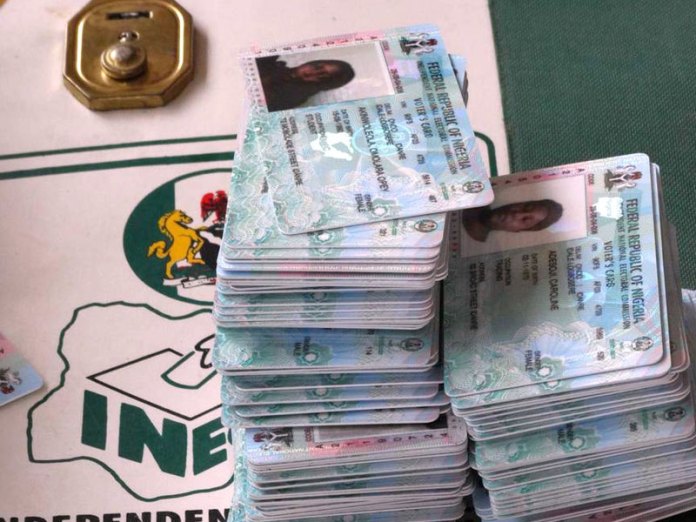- National Assembly to Reconvene for INEC’s Budget
The leadership of the two chambers of the National Assembly may have resolved to reconvene the feral legislature next week, to consider the N242 billion budget proposal for the Independent National Electoral Commission (INEC) for the conduct of the 2019 general elections.
This was disclosed on Wednesday by the chairman of the INEC, Prof Mahmood Yakubu shortly after a closed door meeting with the leadership of the two chambers of the federal legislature.
Speaking earlier at the opening session of the meeting, Prof Yakubu said unless something is done urgently, INEC might miss the six-month window for the procurement of certain tools and equipment required for the conduct of the election.
According to him, to meet up with the six-month window, the required funds should be in the commission’s coffers by August 15, a day that the six months will start counting before the date for the first round of election.
The INEC chair further explained that of the N242 billion budget proposal, N164 billion was urgently needed by August 15, to enable the commission purchase the first batch of tools and equipment.
Yakubu said the INEC would make do with the initial N164 billion, while awaiting the remaining N78 million that would be processed later through a supplementary budget.
The INEC chair observed that this would be the first time since 1999 that the commission’s election budget would be subjected to scrutiny by the National Assembly.
He stated that in all the previous election circles, the commission used to get its funds on time for preparations and execution of its mandate.
While tabling the N242 billion INEC budget proposal before the legislature two weeks ago, President Muhammadu Buhari had requested the lawmakers to vire N164 billion of the estimate from funds already allocated to members’ constituency projects in the 2018 national budget.
It’s however unclear whether the lawmakers would be considering the INEC budget along the template suggested by the President.
Speaking earlier, the President of the Senate, Dr. Bukola Saraki, said the proposal from the President had not been acted upon by the Senate, stressing that the President’s letter conveying the proposal was only read to senators on the floor.
Sating that the document has yet to be referred to the appropriate standing committees of the Senate, Saraki said the leadership of the legislature would ensure that the matter gets resolved by next week.
On his part, the Speaker of the House of Representatives, Yakubu Dogara, said INEC’s budget ought not be presented through a “fire brigade” approach.
According to him, every Nigerian knew that the general elections would be coming up in February 2019 and so provisions for the INEC’s election budget ought to have been submitted alongside the 2019 national budget proposal.
The National Assembly leadership has yet to pick a definite date for the lawmakers to return to their duty posts for the purpose of addressing the matter.
The federal legislature had seen on its annual vacation since July 24 and expected to resume on September 25.
Spokesman of the Independent National Electoral Commission (INEC) National Chaorman Rotimi Oyekanmi also yesterday said the number of registered parties may rise to 85 from 68 before the elections.
He said: “Yes. There are 68 registered political parties at the moment and we have over 130 applications from associations seeking registration as political parties. Our projection is that we might end up with between 80 and 85 political parties before the 2019 general elections.”
He said out of this figure, 74 have failed the initial assessment of the suitability of their names and logos while 62 have passed the initial assessment. Nine (9) associations have undergone verification of their offices and proposed leadership while 16 are either awaiting verification or yet to supply supporting documents.
The INEC chief spokesman said despite the powers granted the commission by the electoral Act, it will be difficult to check the menace without the involvement of all the stakeholders.
According to him, “Indeed, Section 124 of the Electoral Act 2010 (as amended) identifies “Bribery and Conspiracy” as an offence and those who contravene it are liable upon conviction to 12 months imprisonment or a fine of N500,000 or both. However, INEC does not have the power to arrest offenders. But INEC wants all stakeholders to get involved in tackling this Voter Buying and Selling phenomenon. In any case, it is not a new thing, it only seems to be getting worse. Indeed, it is a threat to our democracy but it should not be INEC’s responsibility alone to tackle it.”
FacebookTwitterGoogle+PinterestLinkedInWhatsApp


 Naira3 weeks ago
Naira3 weeks ago
 News4 weeks ago
News4 weeks ago
 Naira4 weeks ago
Naira4 weeks ago
 Naira3 weeks ago
Naira3 weeks ago
 Jobs3 weeks ago
Jobs3 weeks ago
 Travel3 weeks ago
Travel3 weeks ago
 Naira3 weeks ago
Naira3 weeks ago
 Investment4 weeks ago
Investment4 weeks ago





























